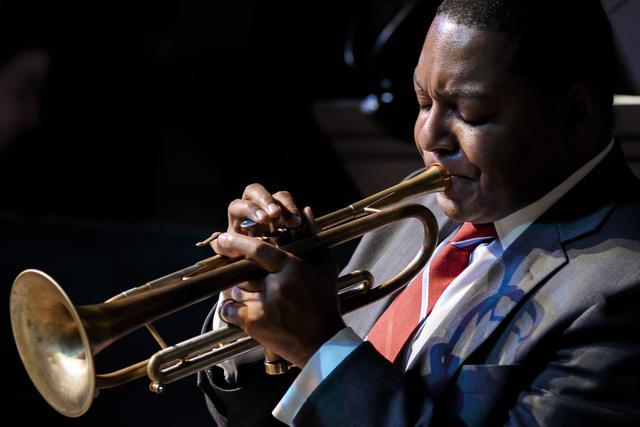by Daniel Hathaway
Orchestra Concerts include the final Cleveland Orchestra performances led by Klaus Mäkelä and featuring pianist Jean-Yves Thibaudet (Saturday at 8), the Contemporary Youth Orchestra (Saturday at 7 pm, Tri-C Metro Auditorium), the Jazz at Lincoln Center Orchestra with Wynton Marsalis (pictured, Saturday at 7:30 in Akron’s E.J. Thomas Hall), and the Cleveland Women’s Orchestra with pianist Donna Lee (Sunday at 3:30 at Severance Music Center.)
Chamber Music performances include the Cleveland Chamber Collective in the premiere of Ty Alan Emerson’s OATH BREAKER (Saturday at 7:30 at Disciples Church), and Cleveland Composers Guild with the Factory Seconds Trio (Sunday at 3 at West Shore Church.)
Vocal Music includes a concert by the vocal ensemble Good Company led by Michael Carney and featuring bassist Tom Flowers and percussionist Andrew Pongracz (Sunday at 4 at Lakewood Presbyterian.)
For more performances, visit our Concert Listings.
ANNOUNCEMENTS:
Faculty changes at the Oberlin Conservatory: Violinist David Bowlin will be moving to Rochester to join the faculty of the Eastman School, and Spanish pianist José Ramón Méndez will succeed Peter Takács upon his retirement at the end of the spring semester. (Read a press release here.)
Tickets will go on sale beginning Tuesday, April 23, for the Cleveland International Piano Competition, which runs from July 28 through August 10. “Sixteen contestants will play cherished classical favorites, bold new works by underrepresented composers, and even a few pop tunes.” Names of the Quarter Finalists who were selected after the First Rounds in Cleveland and Paris will be announced on Tuesday when tickets go on sale.
Jazz trombonist Chris Anderson has been named a 2024 Akron Jazz Hero by the Jazz Journalists Association. Anderson is founder and executive director of Open Tone Music, an Akron-based nonprofit that has provided access to free music education for young people throughout Northeast Ohio for 14 years.. Read more here.
The Music Settlement is sponsoring a free fiddle and banjo workshop hosted by Paul Kirk and Stephen Rapp at its University Circle campus on May 11. Details here.
WEEKEND ALMANAC:
April 20:
On this date in 1928, Maurice Martenot’s electronic musical instrument the Ondes-Martenot (1928) made its debut at the Paris Opéra in Dimitrios Levidis’s Poème symphonique. The soloist was Martenot himself, who had set out to invent an electronic device with the expressive qualities of the cello. Since then, the instrument has found its way into more than a hundred orchestral scores like Oliver Messiaen’s Turangalîla-Symphonie, as well as into film and television soundtracks.
Watch a Seattle Symphony video here where Cynthia Millar demonstrates the instrument Messiaen in conjunction with a performance of his Trois petites liturgies de la Présence Divine.
And on April 20, 1986, at the age of 92, pianist Vladimir Horowitz returned to his native country after living in the West for 60 years to give a piano recital at the Moscow Conservatory. Read an account in the New York Times of that visit here, and watch a remastered video of his performance of works by Scarlatti, Mozart, Rachmaninoff, Scriabin, Schubert, Liszt and Chopin, with encores by Schumann, Moszkowski and Rachmaninoff here.
April 21:
On this date in 1749, a public rehearsal of Handel’s Royal Fireworks Music took place — against the composer’s wishes — at London’s Vauxhall Gardens. Obviously not respecting social distancing, an impressive crowd of 12,000 turned out, causing traffic jams for three hours on London Bridge. The eventual premiere performance on April 27 in Green Park was something of a disaster — one of the pavilions caught fire, rockets went astray, and other effects fizzled due to rain. Click here to listen to a not historically informed performance by the London Symphony led by Cleveland’s own George Szell — he also leaves out the 101 cannons called for at the work’s debut.
And on April 21, 1899, composer Randall Thompson was born in New York City. Best known for his choral music, although he also wrote symphonies and an opera, his Alleluia has been sung around the world. Serge Koussivitsky commissioned it for the 1940 opening ceremony of the Berkshire Music Center at Tanglewood, requesting a piece with simple words (Thompson used “Alleluia” and “Amen”) that could be learned and sung by international musicians in a single, short rehearsal.
While writing it, the composer learned of one of the pivotal moments in World War II, and described his piece as “a sad fanfare for the fall of France.” Click here for a decidedly international performance by Stockholm’s St. Jacobs Chamber Choir at the Basilica di San Pietro in Perugia, Italy.




